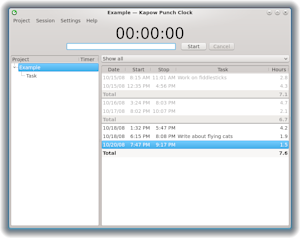Some minor releases
Posted on February 17, 2013, under Hexalate, Kapow Punch Clock, Peg-E, Simsu
Kapow
I have released a minor update to Kapow, version 1.4.4. This release is mostly to add an automatic backup system for the time data that I have been working on. A few users have experienced data loss, and this will hopefully prevent anybody else suffering that. Kapow now makes logarithmic backups (one backup a day for a week, then one backup a week for a month, then one backup a month for a year, and finally one backup a year after that) as well as a temporary backup that gets overwritten with each save. This release also adds support for building with Qt 5, although it is still released with Qt 4 as that is the primary development platform for now.
Longer term I am planning on making it easier for users to store the data file and backups in a location of their choosing, which will default to their documents folder. I have not settled on how I want to expose it in the interface (although you can already do this by using passing an XML file to the program).
Hexalate, Peg-E, and Simsu
I have also made a few other minor releases (Hexalate 1.0.2, Peg-E 1.1.2, and Simsu 1.2.3) over the past two weeks that I have not felt justify a blog post on their own. These releases mainly just add translations and support for building with Qt 5. I plan on making minor releases of the rest of my programs over the next few weeks to also update their translations, and to add support for building with Qt 5.
